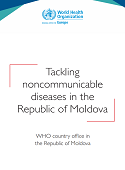Tackling noncommunicable diseases in the Republic of Moldova (2018)

Download
In 2015, the Swiss Agency for Development and Cooperation (SDC) and the WHO Regional Office for Europe agreed on the second phase of a three-year project to support the Government of the Republic of Moldova as it tackles challenges in public health. The challenges include improving the public’s access to better-quality health care, reforming public health and primary health care, and improving health-system financing.
Noncommunicable diseases (NCDs) are at the heart of these areas of concern. Heart disease, stroke, cancer, diabetes and chronic respiratory disease are estimated to account for 88% of deaths annually in the Republic of Moldova; preventing and controlling NCDs is a priority issue for the Government.
In 2016, the probability of dying prematurely from NCDs was 24.9%, with the rate almost twice as high for men (33.7%) as women (17.3%). This burden is driven by some of the highest rates of NCD risk factors, particularly in relation to tobacco and alcohol use, in the WHO European Region.



